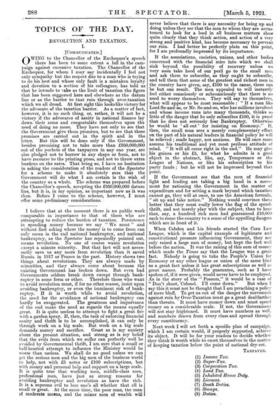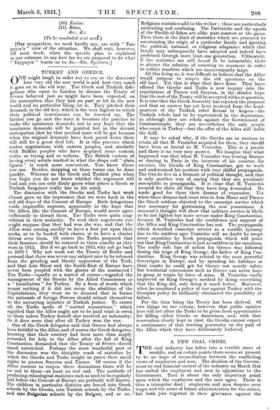TOPICS OF THE DAY.
REVOLUTION AND TAXATION.
I.
[CommuxicaTED.] OWING to the Chancellor of the Exchequer's speech there has been to some extent a lull in the cam- paign against excessive taxation. The Chancellor of the Exchequer, for whom I may say incidentally I feel not only sympathy but the respect due to a man who is trying to do his best and whose only fault is a mistaken loyalty and devotion to a section of his colleagues, has told us that he intends to take as the limit of taxation the figure that has been suggested here and elsewhere as the datum line or as the barrier to that ruin through over-taxation which we all dread. At first sight this looks like victory for the advocate of the taxation barrier. As a matter of fact, however, it is no such thing, or, rather, it will not be a victory if the advocates of sanity in national finance lay down their arms and congratulate themselves upon the need of doing no more. They have not only to see that the Government give them promises, but to see that these promises are carried out in the spirit and in the letter. But this will be done only if the Government, besides promising not to take more than £950,000,000 out of the pockets of the taxpayers in any one year, are also pledged not to borrow in any shape or form, not to have recourse to the printing press, and not to throw extra burdens on the rates. That being so, I have no hesitation in asking the consideration of the readers of the Spectator for a scheme to make it absolutely sure that the Government will do what I am certain is the wish of the country as a whole. The scheme was prepared before the Chancellor's speech, accepting the £950,000,000 datum line, but it is, in my opinion, as important now as it was then. Before I come to the scheme, however, I must offer some preliminary considerations.
I believe that at the moment there is no public work comparable in importance to that of those who are attempting to reduce the burden of taxation. Persistence in spending money because we say " We must " and without first asking where the money is to come from can only mean in the end national bankruptcy, and national bankruptcy, as the Spectator has repeatedly pointed out, means revolution. No one of course wants revolution except a minute minority. But that fact will not neces- sarily save us any more from revolution than it saved Russia in 1917 or France in the past. History shows two things about revolutions. They are always made by minorities, and they always come about because the existing Government has broken down. But even bad Governments seldom break down except through bank- ruptcy in some form or other. Therefore those who want to avoid revolution must, if for no other reason, insist upon avoiding bankruptcy, or even the imminent risk of bank- ruptcy. If it is worth while to avoid revolution, the need for the avoidance of national bankruptcy can hardly bo exaggerated. The greatness and importance of the end make the need as regards the means equally great. It is quite useless to attempt to fight a great fire with a garden spray. If, then, the task of enforcing financial sanity and thrift is to be accomplished, it can only be through work on a big scale. But work on a big scale demands money and sacrifice. Great as is my anxiety about the present situation, and strong as is my belief that the evils from which we suffer can perfectly well be avoided by Governmental thrift, I am sure that a small or half-hearted attempt to influence the Ministry would be worse than useless. We shall do no good unless we can get the serious men and the big men of the business world to help, not with £5 notes or £100 subscriptions, but with money and personal help and support on a large scale. It is quite true that working men, middle-class men, professional men, have just as strong reasons for avoiding bankruptcy and revolution as have the rich. It is a supreme evil to lose one's all whether that all is small or great. At the same time; the poor man, the'man of moderate means, and the minor men of wealth will never believe that there is any necessity for being up and doing unless they see that the men to whom they are accus- tomed to look for a lead in all business matters show quite clearly that they think action, and action of a very strong and positive kind, has become necessary to prevent our rum. I had better be perfectly plain on this point, for I am profoundly impressed by its importance.
If the associations, societies, unions, and other bodies concerned with the financial mire into which we shall sink beyond the possibility of recovery unless we very soon take heed of our peril go to the small men and ask them to subscribe, as they ought to subscribe, and tell them that some of the greatest and richest men in the country have given, say, £100 to the cause, there can be but one result. The men appealed to will instantly feel either consciously or subconsciously that there is no need to worry themselves. They will say, to themselves, what will appear to be most reasonable : If a man like Lord So-and-so, or Mr. So-and-so, who has millions involved and whose income runs into many thousands, thinks so little of the danger that he only subscribes £100, it is proof that ho does not seriously fear Bankruptcy. Otherwise he would be all out ' for insisting on Economy." If, then, the small man sees a merely complementary effort on the part of his natural leaders in financial policy he will be relieved ; made happy, not anxious. He will once more assume his traditional and yet most perilous attitude of mind. " It will all come right in the end." He may give his guinea or his £5, for what he admits is a good object in the abstract, like, say, Temperance or the League of Nations, or like his subscription to his party funds ; but he will not be impressed beyond that point.
If the Government see that the men of financial light and leading are taking a big hand in a move- ment for rationing the Government in the matter of expenditure and for setting a mark beyond which taxation cannot go, they will at once, to use the American formula, " sit up and take notice." Nothing would convince them better that they must really lower the flag of the spend- thrift, and not merely play with the subject, than to hear that, say, a hundred rich men had guaranteed £10,000 each to rouse the country to a sense of the appalling dangers which are in front of it.
When Cobden and his friends started the Corn Law League, which is the capital example of legitimate and constitutional pressure influencing Government, they not only raised a large sum of money, but kept the fact well before the nation. It was the raising of this sum of money which made the Times say that the League was a great fact. Nobody is going to take the People's Union for Economy or any other league or union of the same kind as a great fact unless it has great subscriptions as well as great names. Probably the guarantee, such as I have spoken of, if it were given, would never have to be employed. As in the story of the " Possum," it would be a case of " Don't shoot, Colonel. I'll come down." But when I say this it must not be thought that I am preaching a policy of mere bluff. To get us out of the danger the movement against ruin by Over-Taxation must go a great deal farther than threats. It must have money down and must spend money on a considerable scale. If not, the Government will not stay frightened. It must have numbers as well, and numbers drawn from every class and spread through every constituency.
Next week I will set forth a specific plan of campaign, which I am certain would, if properly supported, achieve its object. It will be for your readers to decide whether they think it worth while to exert themselves in the matter of keeping taxation below the point of national dry-rot.
TAXPAYER.
(1) Income Tax.
(2) Super-Tax. (8) Corporation Tax.
(4) Land Tax.
(5) Inhabited House Duty.
(6) Licences.
(7) Death Duties.
(8) Stamps.
(9) Duties.
(10) Excise.
(11) Rates, &c., cto.
(To be concluded next weep.) [Our sympathies, we need hardly say, are with " Tax- payer's ' view of the situation. We shall wait, however, till next week, when the specific plan is explained in our columns, to say how far we are prepared to do what " Taypayer " wants us to do.—En. Spectator.]



































 Previous page
Previous page